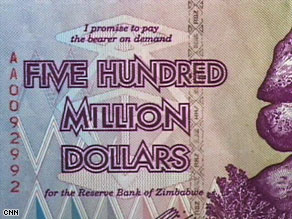
Zimbabwe's new $500 million note
Finance Minister Samuel Mumbengegwi made the announcement about the new note in a government gazette set for release Friday. On the back, the purple cotton bill will feature pictures of dairy cows being milked mechanically and a miner drilling underground, he said.
The Reserve Bank of Zimbabwe (RBZ) last week introduced a new set of denominations, including a $100 million note, but that has not helped to clear long lines for cash at banks. Some people sleep outside banks after failing to get cash.
The RBZ said a $200 million note would be in circulation Friday, together with the $500 million note.
The $500 million note is worth about 8 U.S. dollars and enough to buy just eight loaves of bread. Thursday, the greenback was trading around ZW$60 million and is expected to shoot up in light of the new note's introduction.
Prices change on an almost daily basis as businesses now peg their prices against the U.S. dollar.
Don't Miss
Zimbabwe has had higher denominations than the $500 million note in the past. But over the past two years, the country has slashed zeros from the amount of its worthless currency -- the latest being 10 zeros in August.
Once one of Africa's most promising economies, Zimbabwe is reeling under its worst humanitarian and economic crisis. A cholera outbreak has killed nearly 800 Zimbabweans, forcing hundreds to cross the border into South Africa and Botswana to seek treatment.
The situation has been exacerbated by the closure of government hospitals for more than a month as health personnel demand the government review their salaries and equip the hospitals with medicines and modern machinery.
In addition, 5 million people are in need of food aid, the United Nations says, in a nation that once exported food to its neighbors.

There has been a spate of protests -- including two by soldiers -- over the past four weeks as people voice their displeasure over President Robert Mugabe's policies.
Shortages of most essentials such as electricity, fuel, medical drugs and food have become a common feature in Zimbabwe. That has forced many people to flee the country.








No comments:
Post a Comment